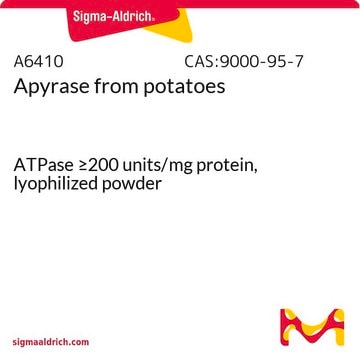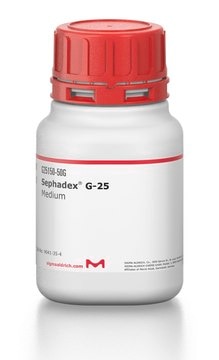A265
ARL 67156 trisodium salt hydrate
≥98% (HPLC), solid, ecto-ATPase inhibitor
Synonym(s):
6-N,N-Diethyl-β-γ-dibromomethylene-D-adenosine-5′-triphosphate trisodium salt hydrate, FPL 67156
About This Item
Recommended Products
product name
ARL 67156 trisodium salt hydrate, ≥98% (HPLC), solid
Quality Level
Assay
≥98% (HPLC)
form
solid
color
white to off-white
solubility
H2O: >20 mg/mL
DMSO: insoluble
storage temp.
−20°C
SMILES string
O.[Na+].[Na+].[Na+].CCN(CC)c1ncnc2n(cnc12)[C@@H]3O[C@H](COP(O)(=O)OP([O-])(=O)C(Br)(Br)P([O-])([O-])=O)[C@@H](O)[C@H]3O
InChI
1S/C15H24Br2N5O12P3.3Na.H2O/c1-3-21(4-2)12-9-13(19-6-18-12)22(7-20-9)14-11(24)10(23)8(33-14)5-32-37(30,31)34-36(28,29)15(16,17)35(25,26)27;;;;/h6-8,10-11,14,23-24H,3-5H2,1-2H3,(H,28,29)(H,30,31)(H2,25,26,27);;;;1H2/q;3*+1;/p-3/t8-,10-,11-,14-;;;;/m1..../s1
InChI key
UWMONIJVKGTUGE-OPKBHZIBSA-K
Gene Information
human ... ENTPD2(954)
General description
Application
- to prevent ATP degradation during cerebrospinal fluid extraction
- as an ATPase inhibitor in ATP quantification assay for preventing ATP degradation in cytoplasm and mitochondrion
- as an ecto-ATPase inhibitor to treat cancer cells for ATP release assay
Biochem/physiol Actions
Storage Class Code
11 - Combustible Solids
WGK
WGK 3
Certificates of Analysis (COA)
Search for Certificates of Analysis (COA) by entering the products Lot/Batch Number. Lot and Batch Numbers can be found on a product’s label following the words ‘Lot’ or ‘Batch’.
Already Own This Product?
Find documentation for the products that you have recently purchased in the Document Library.
Customers Also Viewed
Our team of scientists has experience in all areas of research including Life Science, Material Science, Chemical Synthesis, Chromatography, Analytical and many others.
Contact Technical Service













